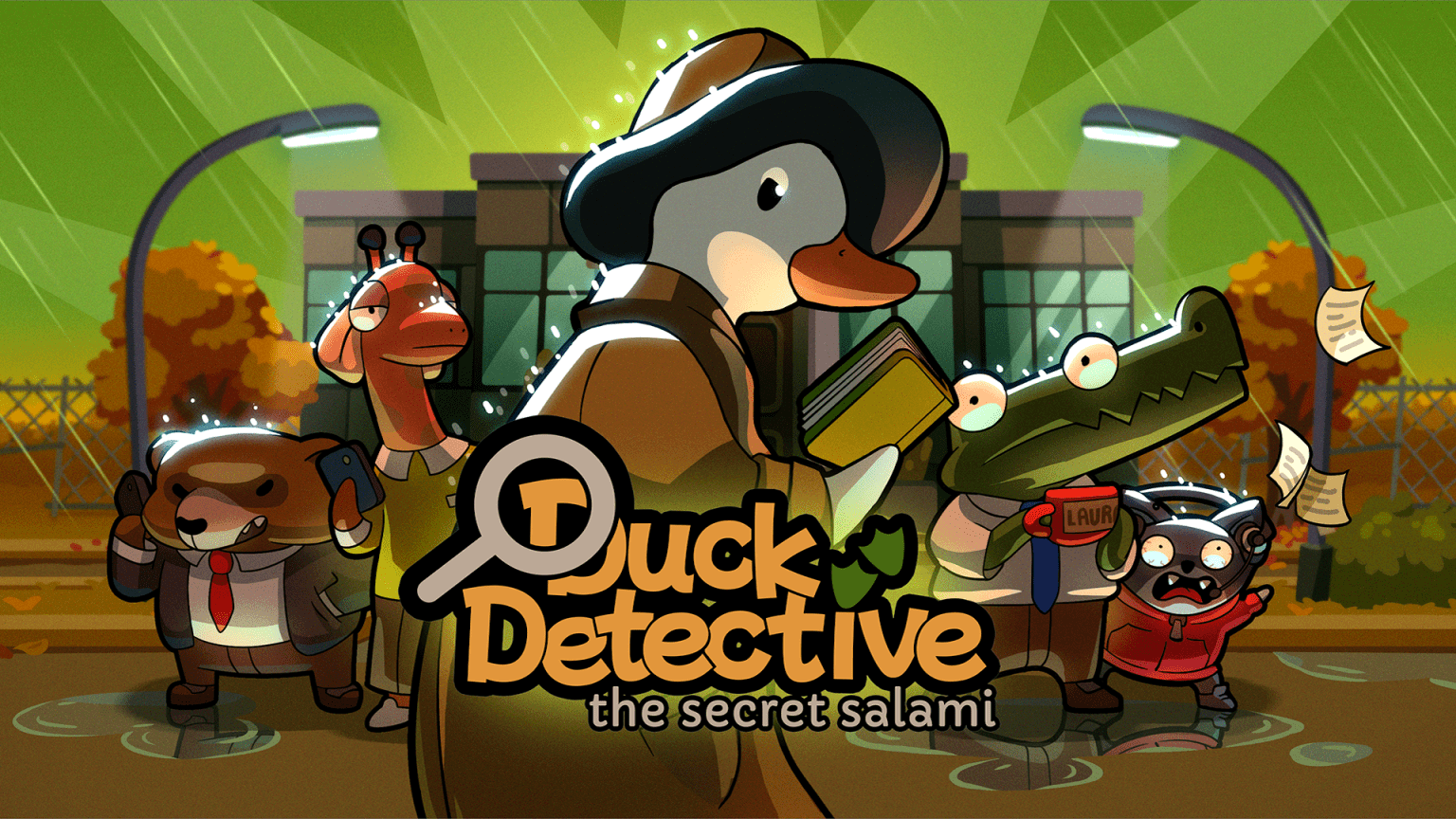There may be no opening scene cliché more perfect than the hard-boiled detective waking up, exhausted and overworked and behind on the case/the rent. Picture Humphrey Bogart, trench coat and fedora, sighing at his desk. The audience is instantly invited in. What has happened to make him this way? Could anything lift him out of it? Does he have another success in him? If he gives up, what will the world do without his pursuit of justice?
We’ve watched this scene countless times in films and television. In mystery video games, this was executed masterfully in Disco Elysium. The alcoholic hero wakes up, having drunk himself to the point of losing his memory. He doesn’t even recall his own name, much less the details of the case he’s investigating.
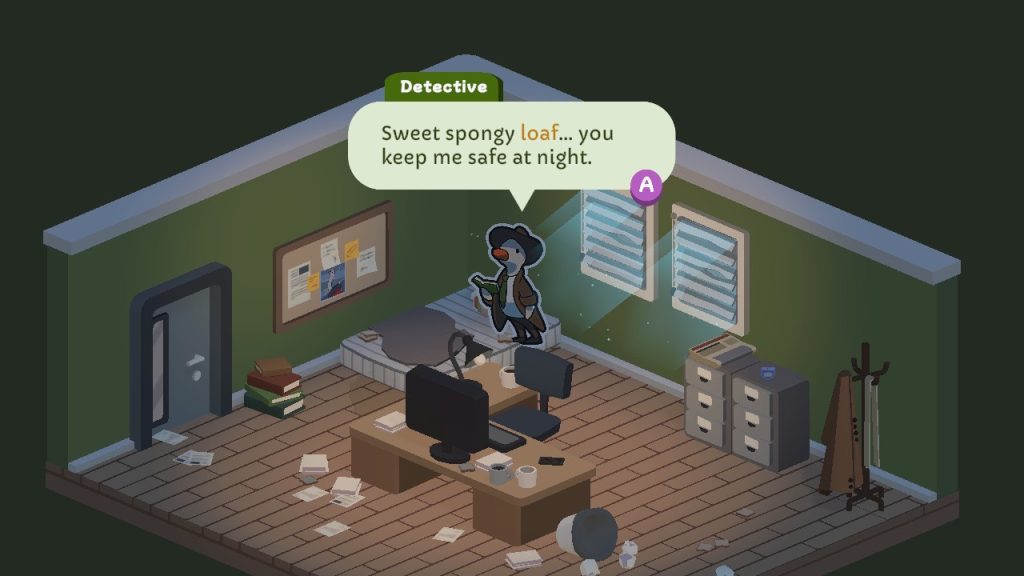
In a no less loving homage to a staple of the genre is the opening scene of Duck Detective: The Secret Salami, a new game out today from Berlin-based indie studio Happy Broccoli (who previously launched Kraken Academy in 2021). The titular hero laments that he has spent all his money on fresh white bread after his divorce is finalized. When he thinks his ex-wife is calling him, he cries out that he barely had a crumb!
Throughout the approximate three-hour playtime of Duck Detective, players will be treated to delightful dialogue, charming artwork, excellent voice acting, and a satisfactory series of logic puzzles. While the short playtime and price point will be a turn-off for many, fans of the mystery genre will certainly enjoy it.
The Game is Afoot!
Given the game’s short runtime, I don’t want to say much more about the plot. As the title suggests, Eugene McQuacklin is a duck that’s also a detective. He is hired to solve a mystery ostensibly of a stolen lunch and unravels stories of corporate espionage and scorned lovers.
The main thrust of gameplay is gathering clues by talking to suspects and exploring for evidence. Much like in The Case of the Golden Idol, albeit in a much easier experience, players go to the Duck’s notebook to fill in the blanks of various logic processes. There is just enough intrigue here to make these puzzles interesting, but usually not enough that they feel mentally taxing.
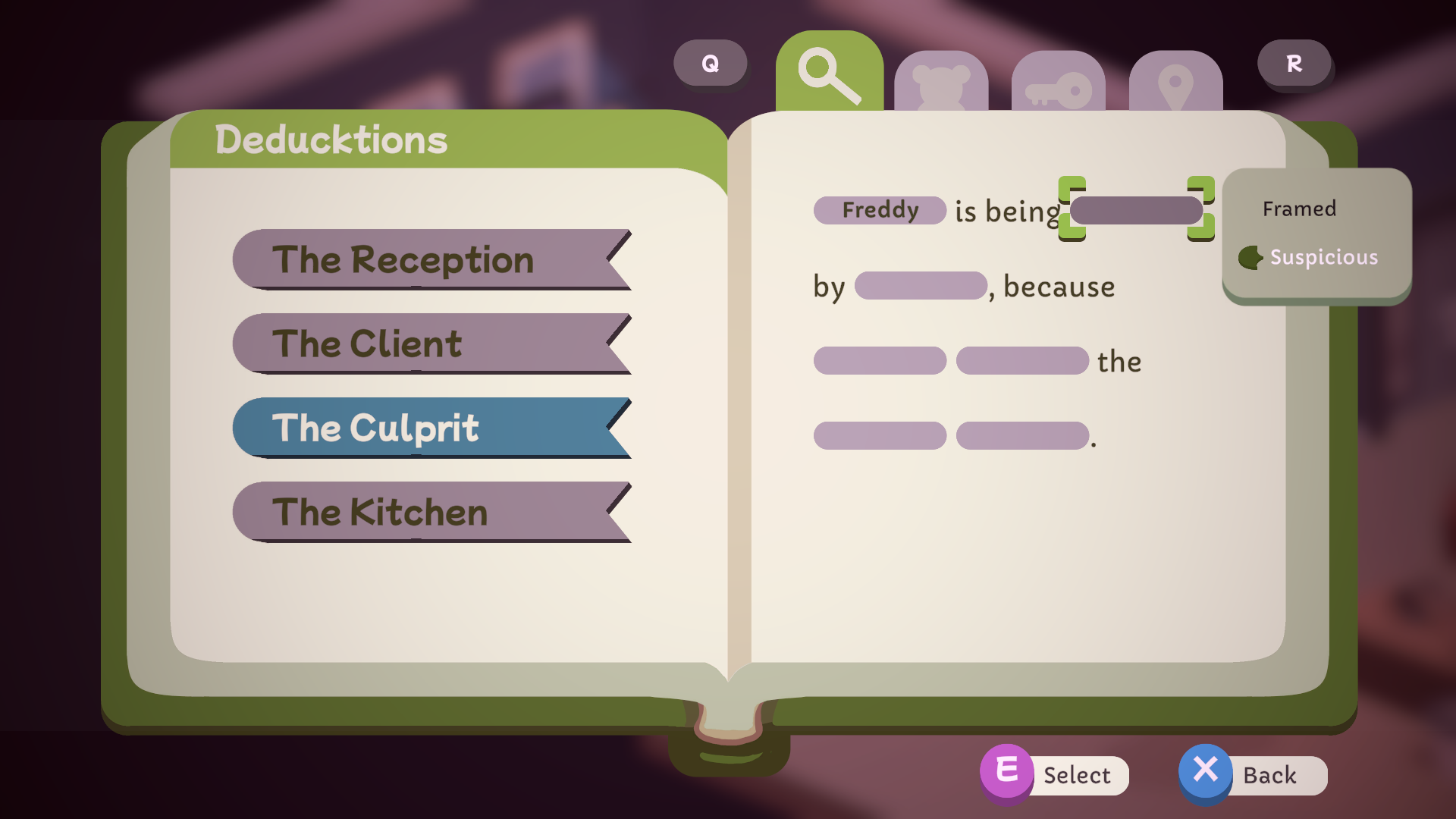
That being said, I did sometimes have trouble parsing out the game’s internal logic. There were some puzzles where I felt I was ahead of the game—I felt I knew who The Salami Bandit was, but the game wanted me to list “The Salami Bandit” and not the actual name of the culprit. On the flip side, there were a few puzzles, like cracking a safe, that the game clearly expected me to be able to figure out. Nothing I thought it could be worked, and even after asking the Detective for hints, I still ended up having to brute force my way through.
I Spy…
Duck Detective: The Secret Salami works best when it embraces and plays with the mystery genre. The protagonist has a notebook with outlines of the available suspects that he can then fill in information on, and a briefcase where he stores clues so he can ask follow-up questions. My favorite part of the game is that the Duck can examine an item or character to take a closer look.
When examining, players move a magnifying glass around the focus, finding three interesting focus areas. Each time he finds one, a word pops up on the screen, follow-up words appear, the duck’s deduc(k)tions (the game’s great joke, not mine!).
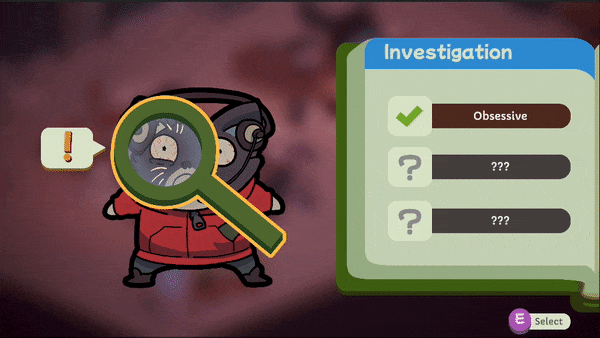
For example, the Duck noted a character’s bloodshot eyes, their twitching hands, then an energy drink in their pocket. What did this mean? “Tired,” “over-caffeinated,” and then ending in: “overworked.” “Overworked” then became a clue I could use in the puzzle. I nodded in satisfaction. Yes. This was a key detail! With another suspect, words appeared slowly on the screen, ultimately labeling one suspect as “lame.” I laughed out loud.
Even though I really enjoyed these moments, I felt there was a missed opportunity for another puzzle and, therefore, an added bit of gameplay to a short game. Rather than letting the qualities appear as fade-in observations, what if the player had to actually do the deductions themselves by choosing from a set of characteristics? This could have invited players to be a part of this Sherlock-ian observation process. (The Great Ace Attorney Chronicles successfully let players do something similar.) Then, I might feel I was a part of the logic process with the hero.
Overall, though, Duck Detective: The Secret Salami is a heartfelt, entertaining homage to the detective genre.
A Wink and a Smile
Duck Detective: The Salami Bandit is genuinely funny and irresistibly charming. The vibes extend from the characterization of grumpy penguin janitors to the hopeful dialogue from Eugene’s biggest fan. The art style is delightful—characters move around like little paper cut-outs. The loading screens have a mix of genuine duck facts and jokes.
Did you know?
A Duck Detective: The Secret Salami loading screen fun fact. I mean, it’s not wrong.
There are over 1000 ducks.
I can feel how much fun the team had making this game. Early on, as the Duck Detective stumbled around his office, I accidentally knocked over his trash can. Poor Duck Detective, his sad disheveled apartment office with paper everywhere. When I got to the client’s office, I knocked over another one. Then, I wondered… can I just knock over every trash can I can find? I did, with glee. About two-thirds of the way through the game, I got a pop-up achievement complimenting me for being a rebel without a cause. And, there’s a button to make the Duck Detective quack at any time!
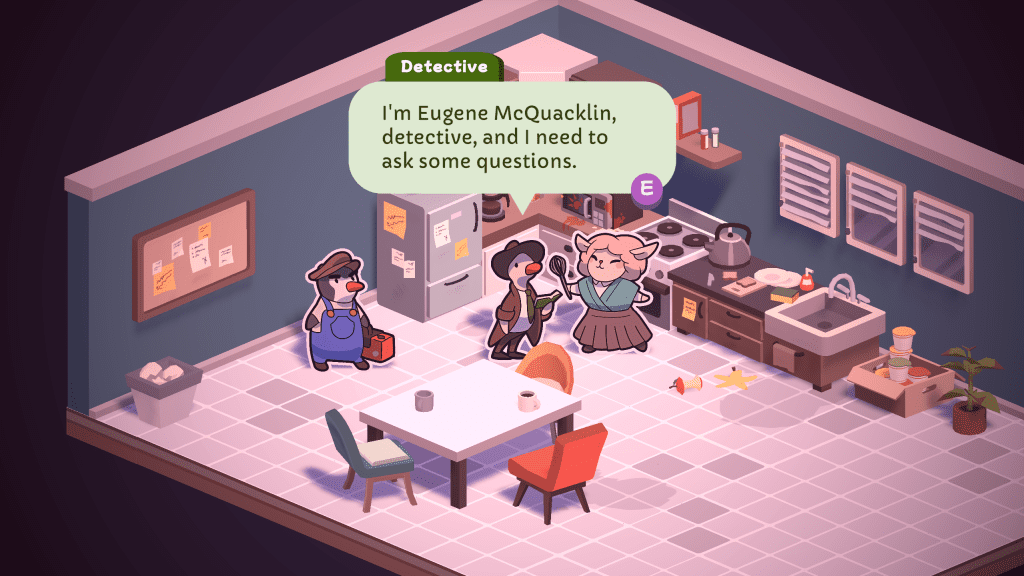
It’s not just how the game looks and feels, but how it sounds. In a video game, audio editing is one of those things that I don’t always consciously notice unless it’s really bad, like unbalanced and mismatched voice tracks or missing key effects, such as the lack of the sound of a sword hitting an enemy. Duck Detective’s audio is extremely polished with vibrant voice acting, good sound effects, and pitch-perfect music.
There’s a sense of joy throughout Duck Detective that is refreshing in our current moment of super moody male protagonists like Cloud and Alan Wake. I had a blast playing it, and was sad it wasn’t longer.
Final Thoughts
Given the length and aesthetic, Duck Detective: The Secret Salami might seem like a game for kids, but I don’t think it is. There’s a couple of references to a “sexy alien book.” The themes of overwork seem to be targeted at tired grown-ups looking for amusement (raises hand).
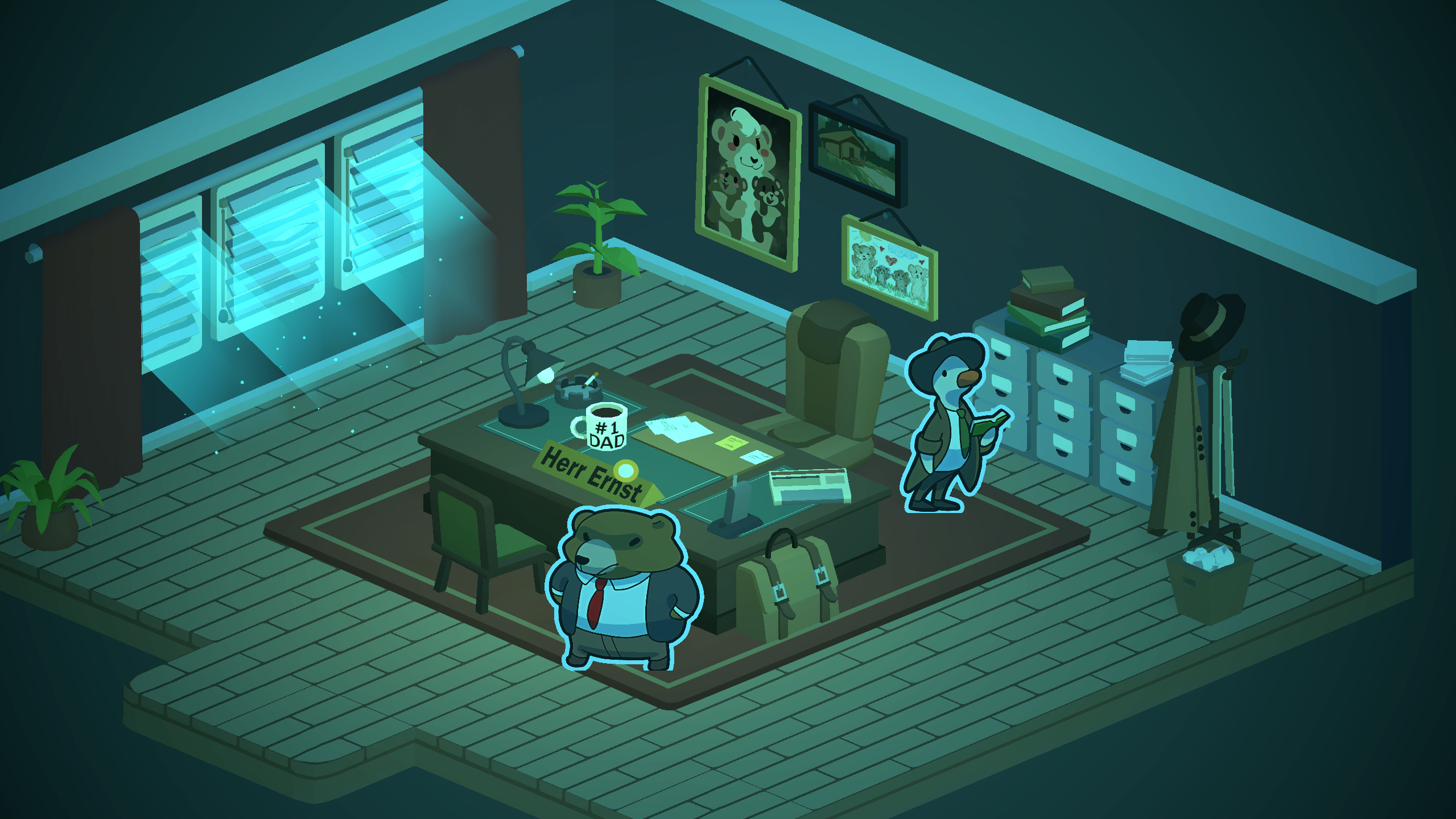
While I got it for free for review, Duck Detective: The Secret Salami retails for $9.99 with a 10% launch discount. Happy Broccoli has been pretty clear in all promotion materials that the game has a two- to three-hour runtime, so hopefully players will know going in what they’re about to get. I would personally find it difficult to justify spending this price for the gameplay length—for now.
As I played, I was frequently reminded of Zack’s (excellent and funny) review of The Frog Detective collection, and not just because it was two quirky games about animals I love solving crimes. Zack writes how the three Frog Detective cases—games released over the course of four years—worked best when packaged all as one collection. I could see Duck Detective going down this path. I just hope Happy Broccoli will have enough funds and energy to make sequels.
While Duck Detective: The Secret Salami is over a bit too quickly and has occasional gameplay shortcomings, the quality of everything else is just so superb that I can’t help but smile.
I want the world for Duck Detective, and I’d like to go with him as he saves the world, one loaf at a time.
Score: 8.0/10
Duck Detective: The Secret Salami is out today from Happy Broccoli Games on Nintendo Switch, Xbox Series X|S, PC, and Mac. MSRP: $9.99.
Disclaimer: A review code was provided by the publisher.
Amanda Tien (she/her or they) loves video games where she can pet dogs, punch bad guys, make friends, and have a good cry. She started writing for the site in 2020, and became an editor in 2022. She enjoys writing about mystery games, indies, and strong femme protagonists.
Her work has also been published in Unwinnable Monthly (click here to read her cover feature on Nancy Drew games), Salt Hill Journal, Poets.org, Litro Magazine, Public Books, and more. She was the Co-Founder and Editor-in-Chief of Columbia University's Culinarian Magazine, and served for two years as the Managing Editor of Aster(ix) Literary Journal.
She recently graduated with a MFA (Master of Fine Arts) in Creative Writing from the University of Pittsburgh. Her writing, art, graphic design, and marketing work can be viewed at www.amandatien.com.
She does not post a lot on social, but you can find her on X and on Instagram.


